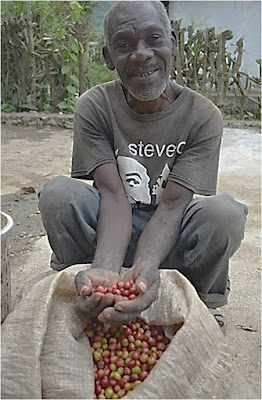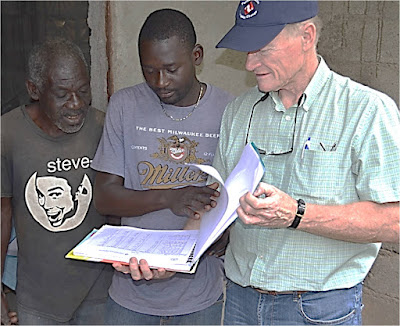F2F Volunteer, Bryce Malsbary, Helps Haitian Coffee Cooperatives Create Business Plan and Strategic Goals
Farmer-to-Farmer volunteers aren’t
always farmers or agricultural specialists. Often, some of the host
organizations we work with ask for specialists in areas such as business
development or marketing. This is the case of Bryce Malsbary’s most recent assignment
to Haiti. In October 2016, Mr. Malsbary traveled to Haiti to assist ATD and
CACEMUD, two coffee cooperatives, to develop a business plan and identify organizational
goals and strategies they felt important to pursue. Mr. Malsbary has over 36 years of experience in Human Resource Management and serves as an international business consultant. He is a Farmer-to-Farmer veteran, having completed over 25 international assignments that have focused on improving business operations of agricultural cooperatives, developing best practices in board and management operations, strategic planning, and conflict resolution. See more information on Mr. Malsbary’s most recent F2F assignment
below.
Adapted from the trip report of Bryce Malsbary
Background
Activities
Personal Reflection
Adapted from the trip report of Bryce Malsbary
Background
 |
| Coffee co-op member shows off his newly harvested coffee beans |
Per capita income in Haiti is less than
$900. At one point in time prior to the
1950’s, Haiti was the third largest coffee producer in the world. Haiti coffee production continued to decline
since then as a result of political instability, plant disease, and environmental
factors. Partners of Americas and USAID
are implementing F2F development projects in an effort to strengthen coffee
cooperative capacity and revive the Haiti coffee industry.
ATD and CACEMUD are two coffee cooperatives
created in 2012. Both cooperatives have very similar issues, primarily lack of
capital to buy member production and limited member production capacity to meet
the market demand for green coffee. CACEMUD has had difficulty over the last 3
years and, in 2014, was not able to buy or sell any member produce. ATD has
shown steady growth over the last 4 years and projections indicate that both
production yield and sales profits will increase at a steady rate through 2020.
However, the challenge for both of these cooperatives will be how to generate
additional capital and improve coffee production yield.
This F2F assignment is to focus on developing
a business plan and identifying some tangible and achievable strategies which
will provide some direction where CACEMUD and ATD can measure performance toward goal
achievement. The purpose of developing a business plan and identifying some
strategies is to advance CACEMUD and ATD to the next level of performance. This
document will be used as an introduction to improve financing possibilities and
acquaint prospective buyers with each cooperatives’ quality product, their
projected production yield, and anticipated growth potential.
Activities
Upon my arrival to Cap Haitian on Sunday
October 23, meetings were schedule with both CACEMUD and ATD coffee
cooperatives for the next two weeks of my assignment. The first two meetings
with both of these groups were with at least 3 board members in a meeting room
in the hotel where I was staying. During the meetings, we discussed some of the
major challenges each cooperative faced and reviewed the objectives of my
assignment. We also agreed to draft a mission, vision and conducted a SWOT
analysis to get a better idea of the cooperatives current status with regard to
strengths, weaknesses, opportunities and threats. The mission, vision and the
results of the SWOT analysis were drafted by the volunteer utilizing the input
obtained from the board discussions. Once drafted, however, a meeting with the
cooperative members was scheduled for both cooperatives to review and allow
feedback and input.
 |
| F2F volunteer Bryce Malsbarry (right), reviews with revenue records with cooperative members |
I also travelled to Dondon where the two
cooperatives were located and visited their existing facilities and some of the
seedling areas. There, I reviewed with the hosts a second draft of the mission,
vision, and SWOT analysis and began collecting data to build their business
plan. We also identified 5 goals that the board wanted to achieve over the next
several years. During the final week of
the assignment, we held focus group member meetings where we reviewed the
mission, vision, SWOT results and discussed cooperative components, the
benefits of a cooperative, developed the member values for each cooperative,
and obtained member concurrence that the goals identified by the board were
reasonable and achievable. The agenda
for the focus groups also included some training and discussion on the
components and benefits of an agriculture cooperative, board of directors and
member responsibilities, and a review of why cooperatives succeed or fail.
A meaningful business plan was developed
that both cooperatives can utilize to establish financial relationship with
lending institutions and instill confidence that each co-op is operating
effectively and efficiently. Also the
goals each co-op has identified can be achieved if they follow the format
outline I discussed with them.
Personal Reflection
On
his assignment, Bryce says, “I
enjoyed this assignment and am appreciative of Stessy [the F2F field officer] and Benito’s [the F2F Country Coordinator] guidance and
historical perspective to help me better understand some of the issues not only
facing the two cooperatives but Haiti in general. The farmers face many challenges but have a
determination that I believe will advance them forward into a higher coffee
producing nation as they have been in years past.”

.png)

Comments
Post a Comment